5 Feb 2014 | News and features, Politics and Society, United Kingdom
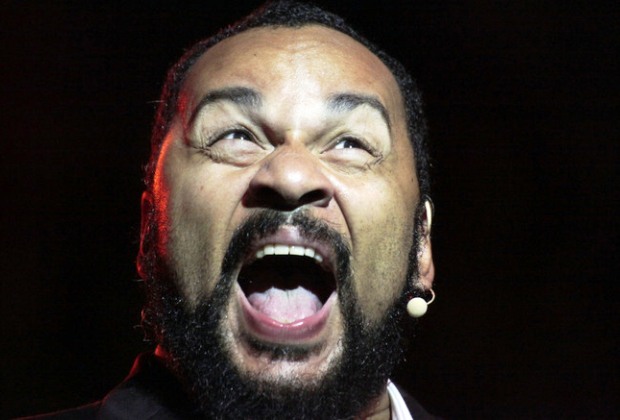
Dieudonné M’bala M’bala has been banned from entering the UK. The French comedian has long been a controversial figure in his home country, but he became internationally known when West Bromwich Albion striker Nicolas Anelka celebrated a goal with the now infamous quenelle — a sort of inverted nazi salute created by Dieudonné, his friend.
Dieudonné argues he is simply standing up to the establishment, and that the quenelle is an anti-establishment gesture. The facts tell a different story. He has made a number of clearly antisemitic comments, and has been convicted in France of inciting racial hatred.
Dieudonné was set to visit the UK to support Anelka, who has been charged by the Football Association over the incident, and faces a minimum five-match ban. As a colleague pointed out, it’s unclear how, exactly, further links to Dieudonné would help Anelka, but that is now beside the point, as he has been “excluded from the UK at the direction of the Secretary of State”. A letter from the Home Office, obtained by Swiss newspaper Tages-Anzeiger, states that he should not be allowed to board carriers to the UK. If he gets as far as the border, he’ll be turned away at the door, as it were.
But Dieudonné is not alone. Over the years, a number of controversial speakers, covering pretty much the entire spectrum of extremist ideologies, have been banned from entering the UK. The reasons given from the Home Office are almost always along the vague lines of the person in question not being “conducive to the public good”. Below are some the most high-profile cases.
Pamela Geller and Robert Spencer
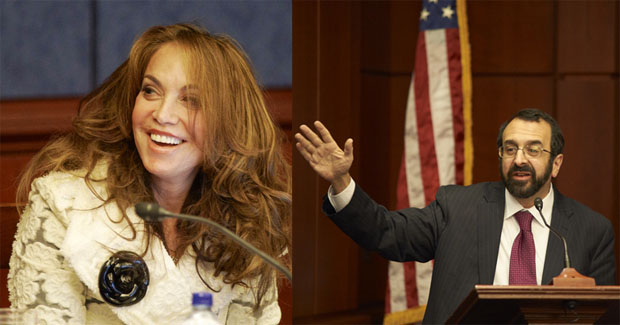
(Image: Mark Tenally/Demotix)
The American “counter-jihadists” were last May invited to speak at an EDL rally in Woolwich, London, at the scene of the brutal murder of Drummer Lee Rigby. However, they both received letters from the Home Office, informing them that based on past statements they were barred from entering the UK. One of Geller’s comments highlighted was: “Al-Qaeda is a manifestation of devout Islam… It is Islam.” In a joint statement, they declared that “…the British government is behaving like a de facto Islamic state. The nation that gave the world the Magna Carta is dead”.
Geert Wilders
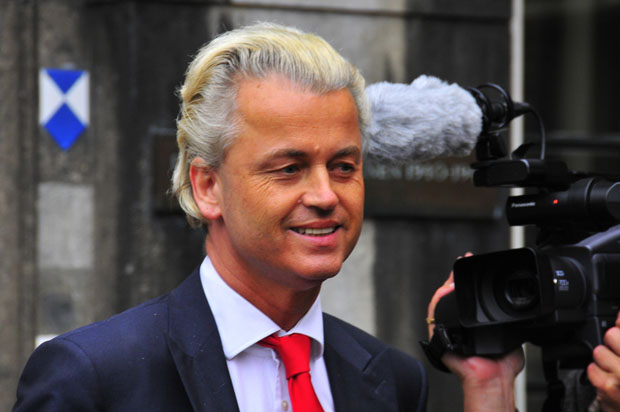
(Image: Frederik Enneman/Demotix)
In 2009, leader of the far-right Dutch Party for Freedom was set to travel to the UK to show his controversial film Fitna — which has been widely labelled as Islamophobic — in the House of Lords. Despite being told by the Home Office before travelling the he was barred from entry because his views “threaten community harmony and therefore public safety”, he still flew to Heathrow, where he was eventually stopped at the border. “Even if you don’t like me and don’t like the things I say then you should let me in for freedom of speech. If you don’t, you are looking like cowards,” was his message to British authorities at the time. The decision was later overturned.
Fred Phelps and Shirley Phelps-Roper
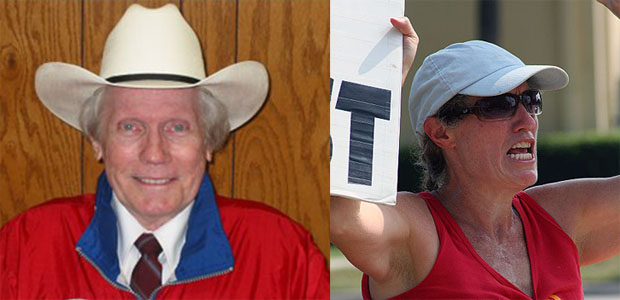
(Image: Wikimedia Commons)
The father and daughter, both members of the infamous Westboro Baptist Church — know, among other things, for picketing funerals — were planning on coming to Leicester to protest against a play about a man killed for being gay. The UK Border Agency said at the time: “Both these individuals have engaged in unacceptable behaviour by inciting hatred against a number of communities.”
Terry Jones
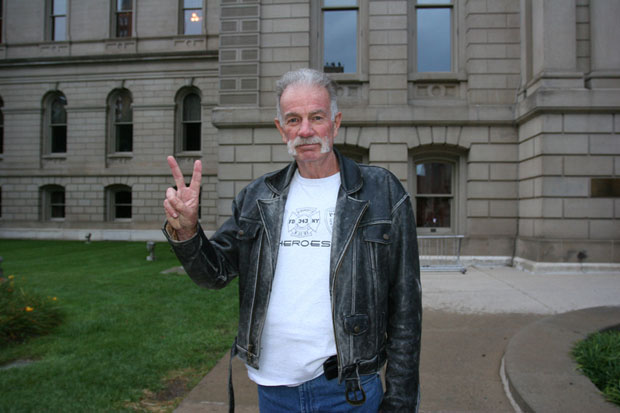
(Image: Mark Brunner/Demotix)
The American pastor became known across the world when he threatened to stage a mass burning of the Koran in 2010 to mark the anniversary of 9/11 — something which in the end did not take place. In 2011 he was invited to attend a number of demonstrations with far right group England Is Ours. However, he was banned by the Home Office, which cited “numerous comments made by Pastor Jones” and “evidence of his unacceptable behaviour”. Jones responded saying: “We feel this is against our human rights to travel and freedom of speech.”
Dyab Abou Jahjah

(Image: Wikimedia Commons)
The then Belgium-based founder of the Arab European League spoke at a meeting of the Stop The War Coalition in March 2009. He left the country with the intention of coming back after a few days, only to discover that he was barred from entering Britain. His organisation had previously published “a series of antisemitic and Holocaust revisionist cartoons in response to the Danish Muhammad cartoons controversy.” Around the time of his visit, the president of the Board of Deputies, Henry Grunwald QC, wrote to then-Home Secretary Jacqui Smith “raising concerns about Jahjah”. In a post on his website, he said he believed his ban was “mainly to do with the lobbying of the Zionists”.
Louis Farrakhan
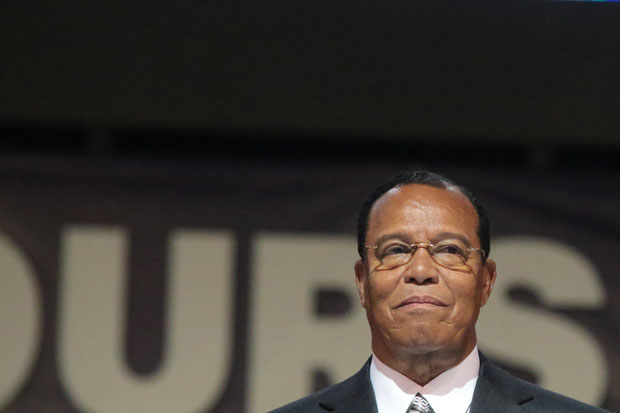
(Image: Thabo Jaiyesimi/Demotix)
The American Nation of Islam leader has been banned from entering the UK since 1986, due to racist and antisemitic remarks like calling Jews “bloodsuckers” and Judaism a “gutter religion”. The ban was briefly overturned in 2001 by a High Court ruling, but the government won out in the Appeals Court the following year.
Michael Savage
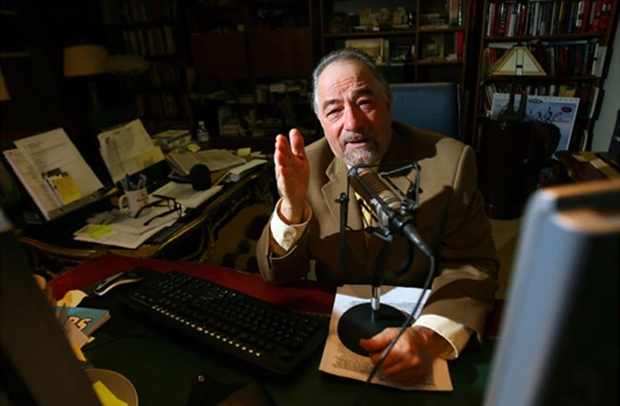
(Image: Clifford Dombrowski/YouTube)
In 2009, then Home Secretary Jacqui Smith announced a 16-person banned-list, made public in a bid to explain the authorities reasoning for barring people from entering the country. On the list was shock-jock Savage — a popular American talk radio host, who has outraged listeners with comments like “Latinos ‘breed like rabbits'” and “Muslims ‘need deporting'”. He was banned for being “likely to cause inter-community tension or even violence”. Savage reacted with disbelief, claiming he would sue Smith. The ban was reaffirmed in 2011.
This article was originally posted on 5 February 2014 at indexoncensorship.org
3 Oct 2011 | Uncategorized
Gainesville continues to be the battleground for a debate about Islamophobia and free speech in the United States, thanks to the Dove World Outreach Centre, which has its headquarters in the Florida city. Pastor Terry Jones first brought international attention to the centre when he threatened to burn a Koran on the anniversary of 9/11 in 2010. More recently, the centre has been involved in a court case against the Alachua County school board, after student members of the church were sent home for wearing T-shirts saying “Islam is of the devil”. According to Senior District Judge Stephan Mickle, the decision to send home the students does not violate their First Amendment rights, and he said that the message was “confrontational” and “not conducive to civil discourse on religious issues”. On the other hand, Pastor Wayne Sapp was surprised by the ruling, saying he felt that the case was a clear violation of the rights of the students.
The Dove World Outreach Centre actually seems to be a small group of attention-seeking loons, not unlike the Westboro Baptist Church. My attitude towards both organisations is the same: let them express themselves.
At the time of the 9/11 attacks, I was a hijab-wearing student at an American high school. In the few days following the attacks, I remember a few of us complaining about students wearing anti-Osama Bin Laden T-shirts because we were afraid of backlash against Muslim students. Rather than questioning our fear, the administration made the students change their shirts. Looking back, I disagree with the teenage version of myself. I did not feel safer when “controversial” perspectives were not brought up in class and I watched my school become more segregated and tense. Instead, my school should have made more of an effort to create a dialogue and, more importantly, make students like myself feel safe enough to be normal students free to express our opinions.
Gainesville will not have to worry about the Dove World Outreach Centre casting a negative light on the town for much longer. The centre is relocating from the 20-acre property and 20-30 younger members of the church will be moving to a different county. So Gainesville can return to being well known for university football and Gatorade rather than a man with a handlebar moustache and threats to burn Korans.
8 Apr 2011 | Uncategorized
Respected US Senator Lindsey Graham said a remarkable thing last Sunday morning on one of the weekly political round-up shows that are popular with Washington insiders.
“I wish we could find some way to hold people accountable,” the senator from South Carolina said, responding to the Koran-burning stunt by a fringe Florida pastor that prompted deadly riots in Afghanistan. “Free speech is a great idea, but we’re in a war. During World War II, you had limits on what you could say if it would inspire the enemy.”
Americans don’t typically harken back to World War II as a model of right-headed civil liberties restraint; kitschy propaganda posters from that era are a popular attraction in the Smithsonian museum today as a quaint reminder that the US government once threatened civilians that their slightest blabber could cost entire submarines of allied lives.
Sixty years after World War II, Americans more sceptical of their government should be wary of any sentence from a powerful politician that starts, “Free speech is a great idea, but…”
Last Sunday morning, though, Lindsey Graham suggested the country might need to consider pushing back against “actions like this that put our troops at risk” – and then Bob Schieffer, the host of the CBS program “Face the Nation,” pivoted right to a question about arming rebels in Libya.
There was no follow-up on Graham’s deeply controversial suggestion. The New York Times made no mention of the comments. It garnered three paragraphs on Politico.
The oddly muted response capped a strange run for the entire Terry Jones saga. When the Florida pastor threatened last summer, around the anniversary of 11 September, to burn a Koran, hordes of media descended on his small central-Florida church, interfaith religious leaders put the pastor on speed-dial and even Secretary of Defense Robert Gates called to personally plead the military’s case.
Jones finally demurred, a prime example of the theory that the best antidote to hate speech is more speech. An odd thing happened, though, when he changed his mind.
Jones caused an international stir just by threatening to burn the Koran, but when he finally went through with it on 20 March – “It’s like people forgot about us,” he whined to the Washington Post – hardly anyone in America noticed. The lone outsider present for the spectacle appears to have been an unlucky fire department official called to supervise. It took two weeks for the story to ricochet all the way to Afghanistan and back again in the form of dead UN workers before it finally made the front page.
Had no one died — had Muslims overseas not been streaming Jones’ Internet production when his own neighbours were not looking — it’s easy to imagine the incident may have gotten no attention at all.
So why was everyone so riled by the man in September and not in March? And why did the equally provocative suggestion that America curtail wartime free expression as a result go largely undiscussed?
The simplest answer is: We’ve been busy. A more patient and media-savy Jones would have known to wait for a lull in the news cycle. Right now, though, everyone from the president to TV pundits is pretty occupied trying to figure out if we’ve just entered a third war or not. And then there’s the whole issue of the federal government shutting down for the first time in 15 years amid an intractable budget dispute on Capitol Hill.
No one should be faulted for ignoring Jones this time around – in fact, ignoring hate speech before the Internet age was another good way to dilute its power. But Americans need to make time to worry about politicians hedging on the rights of free expression regardless of what else is going on. Forgetting about Terry Jones is one thing; letting Lindsey Graham off the hook is another.
After all, past wars tell the story that free speech is easiest to erode when no one’s paying attention.
5 Apr 2011 | Uncategorized
President Karzai of Afghanistan has called for the Obama administration to condemn the recent Koran-burning in Florida by Pastor Wayne Sapp. The symbolic immolation of the book led to riots that left 22 dead. Obama has obliged by describing it as an act of “extreme intolerance and bigotry”. But Karzai wants Obama to go further and “bring those responsible to justice”.
It is not clear what that would mean in the US. First Amendment free speech protection doesn’t discriminate on the basis of the content of speech short of its posing a direct threat to others. Offensive expression, including symbolic flag- or Koran-burning, is just as protected as liberal political speech-making.
To take the most famous example, the neo-Nazis who wanted to march through Skokie in Illinois in 1977, where many Holocaust survivors lived, had as much right to express their views as anyone else. Controversially, the American Civil Liberties Union (ACLU) sprang to the their defence.
In that case the marchers, having secured their free speech rights in court, were persuaded to protest elsewhere. Only last year Pastor Terry Jones also backed down from this threat to burn Korans on the 9/11 anniversary, though most experts agreed that if he had gone ahead with the burning on private property he would have been unlikely to have committed any crime.
But sometimes offensive protestors follow through and make their point as threatened in a way that triggers strong reactions. In the case of Pastor Wayne Sapp, that’s what happened, and with fatal consequences thousands of miles away in Afghanistan, where another group of intolerant people took violent and utterly inexcusable “revenge” on 22 people.
Free speech issues are rarely straightforward. Some people would like to think they are, but they aren’t. The key question is always where a society wants to draw the line, not whether there should be a line at all. But I believe strongly that explosive reactions on the part of the offended shouldn’t determine where that line is drawn.
Such a reaction would give the power to circumscribe the limits of everyone’s freedom to those who have the angriest voices, and are swiftest to resort to violence. Instead we need to protect the freedom to criticise religion and religions, both in words and symbolic actions, as a fundamental right.
Put simply, no idea or object should be sacrosanct from criticism or ridicule, and we should be clear that we condemn violence far more than we condemn the expression of offensive views. We do not want to go back to the Dark Ages of blasphemy laws, or modern equivalents of them.








